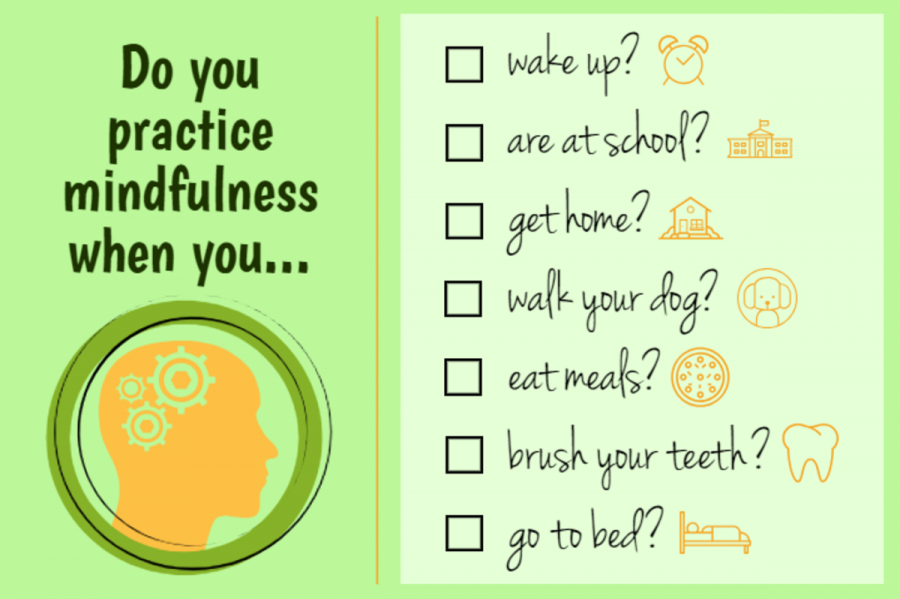Reducing stress: how to incorporate mindfulness into everyday life
June 4, 2018
A sophomore sits in chemistry while her teacher reminds the class of an upcoming test. Her thoughts jump around erratically as she begins to panic, flashing from worrying about how she hasn’t started studying yet to stressing about her time management skills. Eventually, she devolves into what she describes as “an overwhelming whirlwind of emotions.”
Many students experience similar chaotic thought patterns throughout the day as they rush through packed and often stressful schedules. Constantly feeling overwhelmed or unprepared is harmful to mental health, leading students to look for different ways to relieve their stress.
One increasingly popular strategy is mindfulness. While some students may associate the word “mindfulness” with sitting still and silently meditating, mindfulness is actually a positive and controlled mindset that can be applied at any moment during the day.
In recent years, the Stress Busters committee has been working with nonprofit organization Minds Inc. to integrate mindfulness into the school environment. Mindfulness trainers from the program have come to select English classes and run mindfulness seminars, leading students and teachers through meditative exercises.
The techniques they are learning in the seminars have helped them reduce stress throughout the day, sophomore Kate Snedeker said.
“When I’m anxious or stressed during the day at school, I use mindfulness to settle my nerves and relax,” Snedeker said.
Through the following three steps, students can incorporate mindfulness techniques into their everyday lives.
Observe your experiences
Making a mindful observation is taking time to notice something you see, hear, taste, smell or touch. By recognizing the experience, one can stay in the present moment; this is known as wordless watching.
“You can always practice present-moment awareness of whatever you’re doing,” Minds Inc. instructor Mick Neustadt said. “You can take time to pause when you get to class by becoming aware of your breath and checking in with yourself to notice the state of your mind and how you feel in your body.”
Describe without judgement
Try to describe what you observe without assigning a positive or negative value. Making judgements too quickly can cause you to jump to false or unhelpful conclusions. For example, in the sentence, “I’m bad at writing essays,” the word “bad” is an interpretation—assigning that connotation will likely only discourage you from finishing the essay. Instead, describe the observation using facts: “This essay is taking me a longer amount of time to write than I had expected, and I’m feeling nervous.”
Recognizing and limiting value judgements can help reduce stress because it stops you from unnecessarily labeling situations and adopting beliefs that may not be accurate.
Decide what is worthy of your focus
Decide if you’re going to pay attention to an observation or move on from it, based on whether or not it helps you achieve your goal in that present moment. For instance, after observing that you are nervous about a writing assignment, decide whether it is best for you to put aside your nervousness and continue writing or step back and reconsider your approach.
Through her experience working with adolescents and their families, social worker Julie Baron finds mindfulness to be effective in helping her clients.
“Mindfulness is about where you place your attention in the present moment,” Baron said. “We’re always going to have distractions; we’re always going to have worry thoughts; we’re always going to have judgments. We can’t control when they enter our minds, but we can notice that they’re there and then make a choice to bring our attention back.”
When students are able to consciously take a step back while their minds are racing, it prevents emotions from taking over and decreases stress.
“I get really stressed out by being so busy,” junior Sydney Maggin said. “Just taking everything one step at a time, putting things into perspective, kind of clearing my mind of all other thoughts and then only focusing on what I have to get done in the immediate future is something that’s really helpful.”










Susan G Barton • Jun 5, 2018 at 2:31 pm
I am not a student but I can apply all these principles to every aspect of my life and I will begin doing that now! Thank you for writing this article!